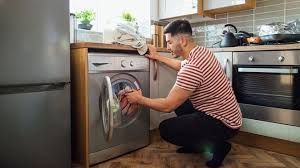Common Questions About Hard Water Issues in Washing Machines: Causes, Solutions, and Prevention
Q: What is hard water, and how does it affect my washing machine?
A: Hard water contains high levels of minerals, primarily calcium and magnesium, which can have several negative effects on your washing machine. These minerals can accumulate over time, leading to limescale buildup on internal components such as heating elements and pipes. This buildup can reduce the efficiency of your machine, increase energy consumption, and potentially lead to costly repairs or a shorter lifespan for your appliance. Additionally, hard water can make it more difficult for detergents to dissolve properly, resulting in less effective cleaning and residue on your clothes.
Q: How can I tell if hard water is causing issues with my laundry?
A: Signs that hard water is affecting your laundry include clothes feeling stiff or scratchy after washing, colors appearing dull or faded, white fabrics turning gray or yellowish, and a soapy residue or powder remaining on garments. You may also notice that your detergent doesn't produce much lather, or that it leaves deposits in the detergent drawer or drum. If you're experiencing these issues consistently, it's likely that hard water is the culprit.
Q: Can hard water damage my washing machine over time?
A: Yes, hard water can cause significant damage to your washing machine over time. The mineral deposits can accumulate and form limescale on essential components like heating elements, pumps, and pipes. This buildup can lead to reduced efficiency, longer washing times, increased energy usage, and eventual mechanical failures. Regular maintenance and preventative measures are important to mitigate these effects and extend the lifespan of your machine.
Q: What can I do to prevent hard water buildup in my washing machine?
A: To prevent hard water buildup, consider installing a whole-house water softener system or using a water-softening additive specifically designed for laundry. Regularly cleaning your washing machine by running maintenance cycles with vinegar or specialized descaling agents can also help remove existing mineral deposits. Additionally, using liquid detergents formulated for hard water conditions can improve cleaning efficiency and reduce residue.
Q: Are there specific detergents that work better with hard water?
A: Yes, certain detergents are formulated to perform better in hard water conditions. Liquid detergents generally dissolve more easily than powder detergents in hard water and are less likely to leave residue on clothes or inside the machine. Look for detergents labeled as "hard water" or "heavy-duty," which contain additives that help soften water and improve cleaning efficiency. Additionally, using a water-softening agent alongside your regular detergent can enhance results.
Q: How often should I clean my washing machine if I have hard water?
A: If you live in an area with hard water, it's recommended to clean your washing machine at least once a month to prevent mineral buildup. Running an empty hot water cycle with two cups of white vinegar or a commercial descaling product can effectively dissolve and remove limescale deposits. Regular cleaning helps maintain the machine's efficiency, prevents unpleasant odors, and extends the appliance's lifespan.
Q: Can I use vinegar to combat hard water issues in my washing machine?
A: Yes, white vinegar is an effective and natural way to combat hard water issues. Adding a half to one cup of white vinegar to your rinse cycle can help dissolve mineral deposits, soften fabrics, and remove detergent residue from clothes. Additionally, running an empty cycle with vinegar can help clean and descale the interior components of your washing machine, keeping it running smoothly.
Q: Is installing a water softener worth it for resolving hard water problems?
A: Installing a water softener can be a worthwhile investment if you experience significant hard water issues. A water softener system removes minerals like calcium and magnesium from your water supply, preventing limescale buildup in your washing machine and other appliances. This can improve cleaning efficiency, extend the lifespan of your appliances, reduce energy costs, and enhance the overall quality of your water for various household uses.
Q: How does hard water affect the energy efficiency of my washing machine?
A: Hard water can decrease the energy efficiency of your washing machine by causing limescale buildup on heating elements and other internal components. This buildup acts as an insulator, making it harder for the machine to heat water efficiently, leading to longer cycle times and increased energy consumption. Regular maintenance and use of water-softening solutions can help maintain optimal energy efficiency.
Q: Are there any DIY methods to soften water for laundry purposes?
A: Yes, there are several DIY methods to soften water for laundry. Adding baking soda or washing soda to your laundry can help soften the water and improve detergent effectiveness. Using white vinegar in the rinse cycle is another effective method to reduce mineral deposits and soften fabrics. These simple household ingredients can be cost-effective alternatives to commercial water softeners and can help mitigate some hard water issues.
Q: Can hard water cause my clothes to wear out faster?
A: Hard water can contribute to clothes wearing out faster due to the mineral deposits that can remain on fabrics after washing. These deposits can make fabrics feel rough, look dull, and cause fibers to break down more quickly over time. Additionally, inadequate cleaning caused by hard water can leave dirt and oils trapped in the fabric, further contributing to premature wear and tear. Using water-softening methods and appropriate detergents can help protect your clothes and extend their lifespan.
Q: Does hard water contribute to unpleasant odors in my washing machine?
A: Yes, hard water can contribute to unpleasant odors in your washing machine. Mineral buildup can create a breeding ground for bacteria and mold, leading to musty or sour smells emanating from your machine. Regularly cleaning and descaling your washing machine, as well as leaving the door open after cycles to allow for air circulation, can help prevent these odors from developing.
Q: How can I test if I have hard water at home?
A: You can test for hard water at home using simple DIY methods or by purchasing a water hardness test kit from a hardware store. A quick method involves filling a bottle halfway with water, adding a few drops of pure liquid soap, and shaking it vigorously. If the water becomes cloudy and lacks suds, it's an indication of hard water. Test kits provide more precise measurements and can help you determine the level of hardness to choose appropriate treatment solutions.
Q: Can using too much detergent help overcome hard water issues?
A: Using more detergent than recommended is generally not effective in overcoming hard water issues and can actually worsen problems. Excess detergent may not dissolve properly in hard water, leading to residue on clothes and inside the machine. This can cause fabrics to feel stiff and may promote mold and bacteria growth within the washer. It's better to use the correct amount of a detergent formulated for hard water and consider additional water-softening methods for optimal results.
Q: Do fabric softeners help mitigate the effects of hard water on laundry?
A: Fabric softeners can help make clothes feel softer and reduce static cling, which may counteract some effects of hard water. However, they do not address the underlying mineral content in the water and may not prevent issues like dull colors or residue buildup. For better results, use fabric softeners in conjunction with water-softening agents or methods to more effectively combat the negative impacts of hard water on your laundry.




